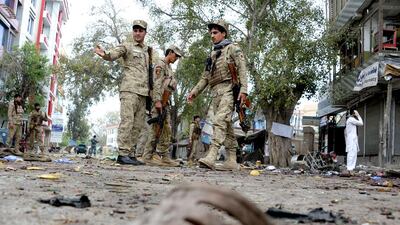JALALABAD, AFGHANISTAN // Days after at least 33 people were killed and dozens more injured by bombings in the city of Jalalabad, torn clothing and pieces of flesh were still stuck in the branches of a tree high above a busy street.
They hung there in the bright sunshine as civilians below struggled to come to terms with the first major attack in Afghanistan to be claimed by ISIL. Government and Nato officials have since cast doubt on whether the movement was responsible, but it hardly matters to those who were there.
Survivors and witnesses told The National that their lives had changed irrevocably when a bank packed with customers was among the targets hit on the morning of April 18. After years of war and countless scenes of devastation, a line had been crossed and they had finally lost hope.
Zahidullah Rahmani had not long arrived at work when the first explosion threw the contents of his stationery shop over him. Struggling outside, he came across limbs and bits of flesh that he compared to leaves scattering the ground in autumn.
“I saw people naked and burnt,” he said. “I saw people with half their bodies missing.”
Mr Rahmani tried to help the injured but was so shocked he could not even speak. He remembered hearing some of them loudly praying, pleading with God to take them as martyrs. “I feel like I have died with all the city,” he said.
Situated near Afghanistan’s eastern border with Pakistan, Jalalabad is the strategically important capital of Nangarhar province. It is one of the few places in the country where US forces retain a significant presence, conducting what are formally described as counterterrorism operations – including drone flights – throughout the region.
While the situation in surrounding districts has been deteriorating for some time, the city itself has always been viewed as relatively safe. This has only added to the confusion about exactly what happened on April 18.
The blast that caused most of the casualties occurred in front of a branch of New Kabul Bank and is believed to have been carried out by a suicide bomber targeting government employees collecting their salaries. Two more explosions were heard soon afterwards. One hit a religious shrine and, according to police, the other was the controlled detonation of a bomb found by security forces. A fourth explosion happened outside town.
Shahidullah Shahid, a spokesman for ISIL, purportedly took credit for the attacks via Facebook. The Afghan president, Ashraf Ghani, then repeated this claim without offering any evidence to back it up. Other Afghan officials, including a ministry of defence spokesman, have joined Nato in doubting ISIL’s culpability.
Among people in Jalalabad there were various theories about who was responsible, with some even speculating it was an act of revenge carried out by the Americans for the April 8 killing of a US soldier in the city by a member of the Afghan army.
Analysts, meanwhile, have claimed the Taliban may have only denied it was involved because of the large number of civilian casualties. In February 2011 its fighters attacked the same branch of Kabul Bank, killing scores of people and causing widespread anger.
For generations, Timor Shah Wafa’s family have looked after the shrine that was hit. That day he had cleaned it and gone out to buy oil to power a generator when a huge blast shook the air. With his house just metres away, his wife and son were wounded by flying glass. His brother was also slightly injured.
Judging by the wreckage left behind, a bomb appears to have been planted on the tiled floor of the shrine, at the top of a small set of steps. Mr Wafa said the device must have been put there very quickly, given that he had been around moments earlier and had noticed nothing suspicious. Debris lay scattered on the ground.
Crying, he told The National he would leave the country as soon as he could if he had the chance. "When I was in the ambulance carrying my family to hospital and I saw the wounded on the way, I swear to God my heart turned black from life," he said. "I wished I could stop living."
There have been growing rumours, media reports and public statements from government officials about ISIL’s attempts to establish a foothold in Afghanistan. In reality, little is known about the movement’s presence here. In February, a former Guantanamo Bay detainee who had claimed allegiance to ISIL was killed in an airstrike in Helmand province.
Survivors of the Jalalabad attacks were furious with the government, accusing it of presiding over growing insecurity since taking power more than seven months ago.
A coalition made up of political rivals, the government has struggled to remain united and has still not appointed a minister of defence. Internal discord within the administration recently led the governor of Nangarhar to resign, saying he had been unable to prevent corruption.
Borhanullah Hamidi, another shopkeeper, said that ambulances had arrived late on the scene on April 18, causing some people to rush the dead and injured to hospital in civilian vehicles.
Describing the government as “two-headed”, he said: “If they continue to fight among themselves for power and money, our future is dark.”
foreign.desk@thenational.ae

